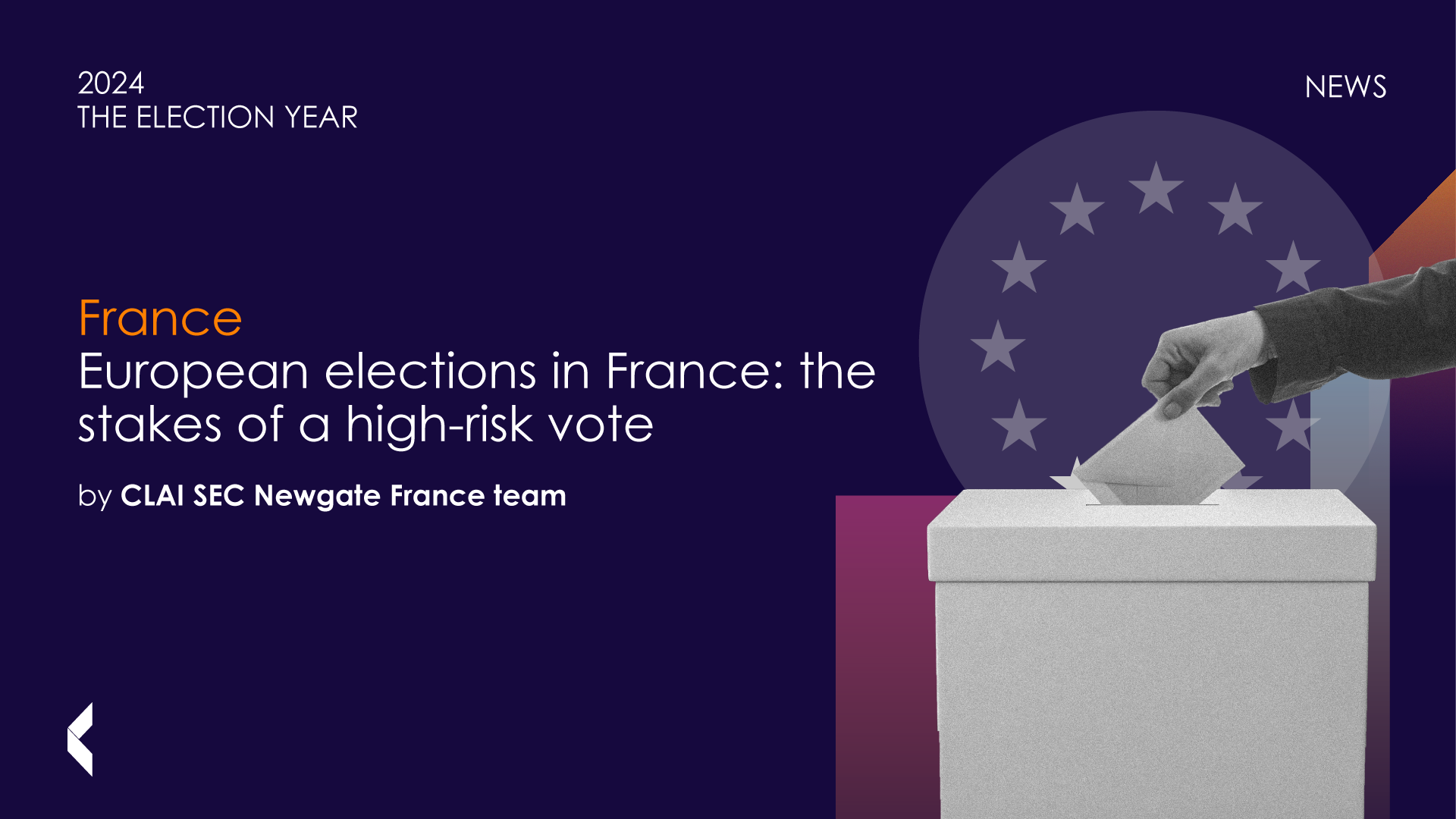About the Author
CLAI SEC Newgate France team
A preoccupied country, divided on Europe’s future
As a founding member of the European Union and a driving force behind its construction alongside Germany, France provided the European Parliament its first president Simone Veil, elected by direct universal suffrage. Today, most French citizens are still attached to the European idea, with 52% of them declaring themselves “generally favourable” to it.
However, the French have supported an ambiguous relationship with European integration since the Union’s inception, reluctantly conceding sovereignty losses if they believed that Europe served their interests. This ambiguous relationship has not changed since the beginning of the European adventure and they could still nowadays embrace General de Gaulle’s statement from 1965 about Europe: ‘No matter how grand the glass offered to us from abroad, we prefer to drink from our own, while raising a toast to those around us.’
And this is where the problem lies: the French feel that European integration is increasingly happening at their expense. In the past, the Common Agricultural Policy (CAP) allowed French farmers to make a decent living from their activity and to export. A month ago, French farmers were protesting the burden of European regulations, especially environmental ones. Previously, the French felt protected by the euro; today, inflation is eroding their purchasing power. In 2015, the European Union appeared as the relevant level to address the migration crisis; today, the French are witnessing Frontex’s inability to secure the borders.
In this context, will French concerns this time sway their vote towards Eurosceptic parties or, at the very least, those hostile to liberal Europe? This is what the National Rally, led by Marine Le Pen, hopes for, and the major challenge that the Renew party, led by President Emmanuel Macron, will have to confront.
A litmus test for the presidential majority
For President Emmanuel Macron’s majority, who won his first election in 2017 by advocating a positive discourse on Europe, the European elections will constitute, in three respects, a real litmus test.
First, because they will allow to assess, at least in part, the relevance of the strategy that the President of the Republic put in place 3 months ago, by appointing a 34-year-old Prime Minister, Gabriel Attal, to inject new energy and youthfulness into his second – and final – term.
Secondly, because this election will allow to gauge where the presidential party stands in public opinion halfway through the term, two years after a tight presidential election, where the National Rally came close to victory, and nearly two years before the municipal election.
Finally, because the President of the Republic has been heavily involved in European issues, which he personally embodies, and therefore, a majority vote for Eurosceptic parties would be a direct rebuke to him.
The opportunity of a rematch for Marine Lepen’s National Rally
For Marine Le Pen’s National Rally, currently credited with nearly 30% of the voting intentions (compared to 18% for President Macron’s Renew party), the European elections are also a strategic stress test.
Indeed, this election will allow the National Rally to gauge the success of the “respectability” strategy it implemented in 2022. This came alongside the election of its 88 deputies to the National Assembly who were tasked with avoiding past excesses, working constructively, and demonstrating responsibility, to portray the National Rally as a party ready to govern, capable of replacing the traditional right-wing party, LR, on the political stage.
If it proves victorious for the National Rally, this election will also confirm the change of stance undertaken by Marine Le Pen on the European question. After advocating for “Frexit” in 2017, which frightened a sizeable portion of the French population, she now presents a more measured, albeit highly critical, discourse on the European Union.
These elections could finally place the National Rally at the centre of the European political stage, if an alliance between the EPP, ID, and ECR, as sought by Matteo Salvini, was to materialise after the elections… and to eliminate, at least temporarily, the traditional right of LR from the political map in domestic politics.
The left-wing parties are advancing in a scattered order
Unlike the legislative election of 2022, where the single-member majority vote forced them to unite within an electoral alliance, the “Nupes,” to avoid disappearance, left-wing parties are expected to go to the European election, governed by proportional representation, in a scattered manner.
For these parties, with the highest-ranked credited with 10% of the voting intentions (the Socialist Party, led by Raphael Glucksmann), the stakes of this election are more national than European. While in 2022, the legislative elections gave Jean-Luc Mélenchon’s France Insoumise (radical left) a leading position within the Nupes, this election is indeed seen by the ecologists and the Socialist Party as an opportunity to regain political weight within the Nupes and in public opinion.
What would be the political aftermath of this election?
If the European elections were held tomorrow, it would have several consequences for the political situation in France.
It would lead to legitimising the image of a “governing party” that the National Rally looks to portray and bring it closer to power, thereby eliminating the LR party. The LR party in any case is losing its grip on the political landscape despite dominating it for decades since General de Gaulle.
On the left, the elections could shuffle the deck and bring the Socialist Party back into the spotlight, which has been reduced to a mere shadow since the crushing defeat of its candidate Benoît Hamon in the 2017 presidential elections, as well as confirm the decline in popularity of France Insoumise in public opinion.
For the presidential majority, this election will gauge the relevance of the strategy in place and could, if the results are too disadvantageous, lead to a new change in government and thus a new political direction.
Overall, this election will be a catalyst for the reconfiguration of political balances in France and a real-life test of what the 2027 presidential elections could bring, in which President Emmanuel Macron cannot run.
The French government – in a nutshell
French Prime Minister: Gabriel Attal (Renew)
French President: Emmanuel Macron (Renew)
Governing coalition: Renew, Horizons (former Prime minister E. Philippe’s party), UDI ( former minister H. Morin’s party)
Opposition: National Rally, Marine Lepen (far right); socialist party, Olivier Faure (center left); la France Insoumise, Jean-Luc Mélenchon (radical left); EELV, Marine Tondelier (Ecologist party);The Republicans, Eric Ciotti (former gaullist party of former President Sarkozy)
To know more:
- Country profile of France, on the EU website

